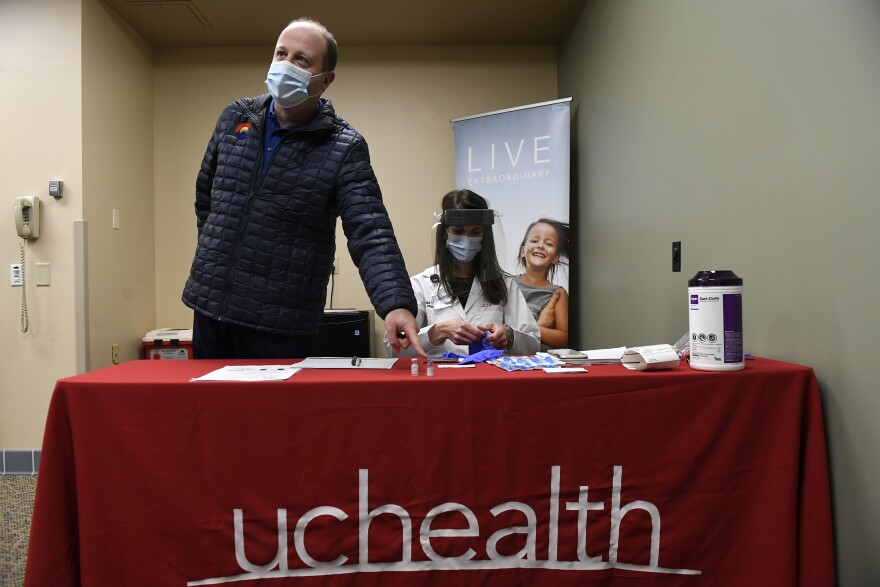Faced with complaints the initial vaccine distribution in Colorado has disproportionately favored white residents in wealthier neighborhoods, state officials have announced several new efforts aimed at making the inoculation effort more equitable.
The plan includes requiring vaccine providers to report demographic data for those getting shots, multi-lingual advertisements aimed at reducing vaccine hesitancy and establishing new pop-up vaccine clinics in areas with more low-income residents and people of color.
The efforts come as new data from the state estimates nearly 68 percent of the vaccine doses have been given to white residents.
Only 4.3 percent of the doses have been given to Hispanics, despite that group representing nearly 22 percent of the state’s overall population.

People who receive the vaccine are not required to report their race or ethnicity, so the data is not an exact picture.
Gov. Jared Polis said Friday “it’s clearly unacceptable” to have the racial vaccine disparity in Colorado.
“That’s why we’re aggressively taking this on,” Polis said. “We’re taking every step we can to be in community health clinics, to be in underserved communities with stand-up clinics … to make sure that everyone in Colorado no matter their race, their heritage, where they live has access to the life-saving vaccine.”
Rick Palacio, a member of Gov. Jared Polis’ vaccine equity task force, says the state is setting aside 10% of its weekly vaccine doses for “hard to reach places.”
“We want to make sure we are increasing and improving and demystifying vaccine access so there is less and less vaccine hesitancy,” he said. “We also want to make sure our outreach efforts are funded.”
The task force will decide on locations for its new pop-up clinics using census data, with the goal of hosting them in half of the top 50 census tracts with high-density, low-income minority communities by the end of this year, Palacio said.
State Sen. Janet Buckner, a member of the Black Democratic Legislative Caucus of Colorado, called the plan “a beginning.”
“I would like for it to be a larger percentage, but I think right now, realistically, this is a good start,” Buckner said. “I am positive that we will eventually be able to increase those numbers.”
COVID-19 has killed Black residents in the United States at , Buckner said, adding that many communities of color are also more hesitant to get vaccinated due to a legacy of racism in the medical research field.
Buckner wasn’t immediately aware of any state-sponsored pop-up clinics planned in her district, which covers southern Aurora. But she is pursuing getting one as soon as possible, she said.
“We know from experience that people like to go where they feel comfortable,” she said. “If I let people know in my district that there’s a pop-up clinic, that should make them more comfortable.”
Earlier this week, the Polis administration also moved to ensure vaccines would be available to undocumented residents. Hispanic and Latino Coloradans have also been disproportionately affected by COVID-19.
In a sent to hospitals and local health departments, the state’s Department of Public Health and Environment asked providers not to check government issued IDs as a requirement for receiving a vaccine.
“We expect providers to follow the state’s guidance on identification, and warn that providers may not be able to continue as COVID-19 vaccination providers if they are unable to do so,” the letter said.
Advocates in Colorado’s immigrant community cheered the decision.
Lisa Taylor, executive director of the Immigrant & Refugee Center of Northern Colorado in Evans, said it was a “crucial move.”
“We’ve seen numerous immigrant community members understandably nervous about accessing services for fear of unintended consequences,” Taylor wrote in an email. “The waiver on ID requirements is so important for us to invite everyone to take the vaccine.”
Colorado so far has vaccinated more than 300,000 people, according to the state’s




